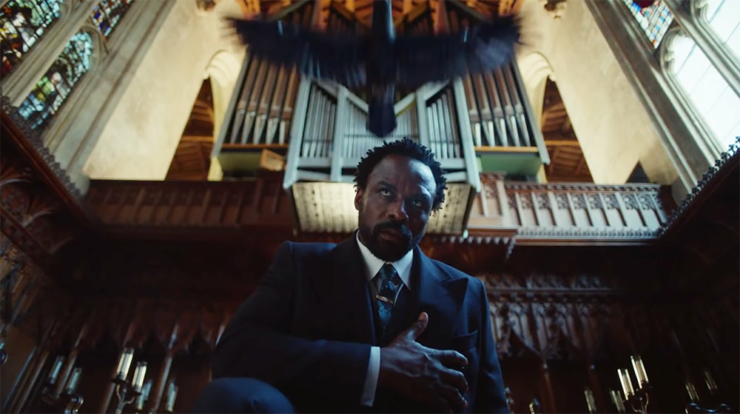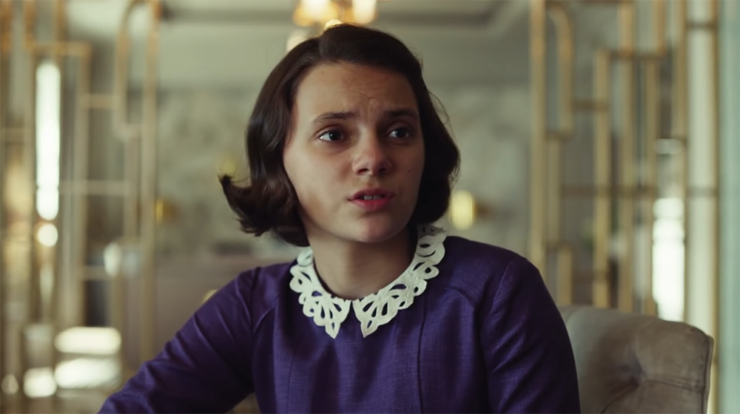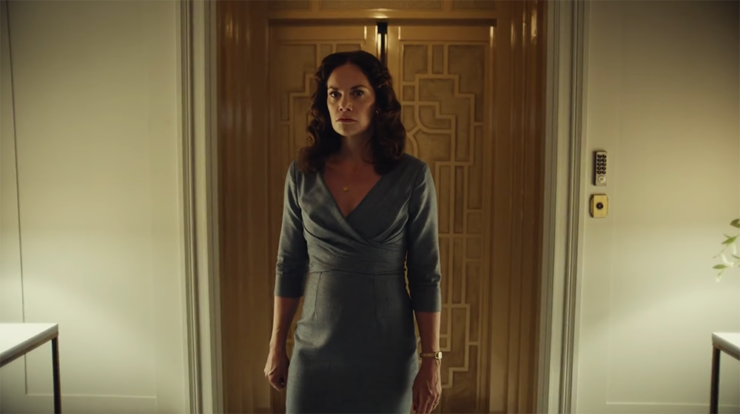The first half of Episode 2 of His Dark Materials follows a number plot threads, many of which come together in the back half. We’ll check out the individual strands first…
Lyra and Mrs Coulter
In a London that cements the 1940s aesthetic I mentioned in my previous essay, Lyra and her new benefactor get to know one another. In a series of scenes set in the latter’s sprawling London flat and the Arctic Explorer’s Club, Mrs Coulter lays out some facets of her particular worldview, expressing a hard-edged cynicism about the glass ceiling and the need for women to be strong and cruel in order to maintain power. Lyra, in an attempt to impress Mrs Coulter accidentally mentions “dust” and must quickly backpedal to keep her promise to Lord Asriel.
Hearing noises in the walls of the flat, Lyra and Pantalaimon attempt to sneak into Mrs Coulter’s office only to find that it is guarded by her daemon-familiar. Lyra is baffled because daemons and their humans can’t be far apart from one another. Mrs Coulter insists that Lyra must be seeing things and sends her off to bed.
Roger, Billy, and the Gyptians
Roger and Billy meet up in a Gobbler safehouse and talk about missing their homes. Meanwhile, gyptian leadership storm a London Rookery only to find it abandoned, though it was clearly once inhabited by the missing children. Tony chafes at having to stay aboard the Costa houseboat but Benjamin takes him aside to invite him into John Faa’s plan.
Lord Boreal

At Jordan College, Lord Boreal meets with the college Master, demanding to see the preserved head of the deceased Stanislaus Grumman. The Master relents only when Boreal threatens him, revealing that he is aware that the college has funded Asriel’s expedition. Down in the Crypts, Boreal and his daemon realize that the skull is not Grumman’s.
Saying they need to “cross over,” Boreal passes through a portal in an abandoned Oxford greenhouse and enters a parallel world very similar to our own. There he meets a lackey named Thomas (Chernobyl’s Robert Emms) in a coffee shop asking if he’s seen anyone matching Grumman’s description.
Father MacPhail
In the Halls of the Magisterium, Father MacPhail is confronted by Cardinal Sturrock (Harry Potter and Peaky Blinders’ Ian Peck) who informs him that the General Oblation Board is overstepping its mandate, raising a stink over the raid by the gyptians. MacPhail then heads to the head of the Oblation Board, Mrs Coulter. Lyra is caught trying to spy on MacPhail and Coulter’s meeting and decides that she’d better hide the alethiometer.
Things Come to a Head…
In the latter half of the episode, tensions flare when Mrs Coulter drops her veneer of beneficence and has her daemon tackle Pantalaimon, causing both Pan and Lyra deep psychic distress. Lyra insists that Lord Asriel will save her and Mrs Coulter accidentally reveals that he is Lyra’s father. She feigns ignorance as to who Lyra’s mother when asked. Lyra consults the alethiometer to no avail, but it twitches from across the room.
The next morning, Mrs Coulter asserts that Roger isn’t really missing at all, which Lyra does not believe. Lyra then sneaks in to Mrs Coulter’s office by way of the air ducts. She discovers blueprints for a sinister, bladed device that clearly does…something to a person and their daemon.
Meanwhile, Mrs Coulter visits the new Gobbler safehouse and tells the children, including Billy and Roger, that she is taking them is a wonderful place in the North called “the Station.” She has the children write letters to their parents, then burns the letters as soon as they are out of sight.
At a soirée hosted by Mrs Coulter, Adèle Starminster, (Broadchurch and Krypton’s Georgina Campbell) a reporter who has snuck in, informs Lyra that her benefactor is actually the entirety of the General Oblation Board and that “gobbler” is a term derived from its acronym. Mrs Coulter and Boreal, who seem to share a history, confront the reporter. Boreal takes her down to his car and crushes her butterfly daemon in his palm, killing her.
Lyra sneaks out of Mrs Coulter’s house along the rooftops and wanders London deep into the night, unsure of where to go. Pantalaimon spots a daemon at the end of an alley just before Lyra is grabbed by unseen hands.
Some Thoughts and Observations

— One of the things that most excites me about this second episode is how much the series is playing with the timeline of the novels’ numerous cosmic revelations. While it is strongly hinted at throughout Book 1, the fact that there are multiple parallel dimensions isn’t really explored until the beginning of the second book, The Subtle Knife. Similarly, the revelation that Lord Asriel is Lyra’s father also comes later in the narrative (she learns the identity of both of her parents from John Faa in the first novel).
It feels like a smart move insofar as this adaptation does not simply follow Lyra as the sole point of view. It would be difficult to keep both the existence of other dimensions and Lyra’s parentage a secret for long, given this format, and I’m excited that they have decided to plunge ahead rather than stretch audience credulity or belabor the (ultimately unnecessary) secrecy. It’s one of those necessary elements of adaptation that is sometimes decried by strict constructionists of a book, but has to occur in order to make the switch to a different medium effectively.
— I’ll probably write more about Mrs Coulter for my more focused essay piece later this week but suffice to say, Ruth Wilson is sheer perfection. Simultaneously more terrifying and more sympathetic than Nicole Kidman’s (admittedly excellent) portrayal in the 2007 film, she brings a complex species of deep sadness to her longing, agonizing stares that are echoed by her daemon. This episode also recalls my favorite book-deviation from that film, where Coulter slaps her familiar, showing a deep divide in her psyche. Because it’s difficult to talk more about Mrs. Coulter without going into some pretty wild spoilers, I’ll save the specifics of that discussion for later in the week. But the level of Wilson’s performance is also reminding me to go back and rewatch Luther, in which she was also utterly fantastic.
— We see a little more of Lyra’s fiery, combative energy in this episode—something that a number of you were disappointed to have not seen more of in the premiere. That said, Keen’s performance still seems a little muted and certainly Lyra is being written as more distressed and panicked than willful and iconoclastic; fingers crossed that she is allowed to be more furious and feral in the coming episodes. Ostensibly, that is why they cast Keen in the first place (her performance in Logan is one long snarl), and that aspect of her character makes for a great contrast to Wilson’s icy, measured glares.
— The flip over to (presumably) our reality really lays bare the degree to which Lyra’s dimension has been aggressively set designed. In the first episode, I thought the 1940s touches were subtle but the “real world” Oxford was a bracing change in aesthetic that caught me much more off guard than I was expecting. The cell phone was especially jarring.
— A closer look at the opening credits seems to reveal that not only the alethiometer (the titular “golden compass” of the American title of the first book) is present, but the other two eponymous artifacts—the subtle knife and the amber spyglass—are there as well. Also, the excellent design of the endlessly splitting skylines would have given away the inter-dimensional reveal long before Season 2.
— Though he is uncredited, I’ve noticed the dashingly handsome and witty Mat Fraser makes an appearance in these first two episodes as one of the gyptians. Fraser is an actor/writer/musician with phocomelia whom viewers might know best as Paul, the Illustrated Seal, on the fourth season of American Horror Story. Seeing as Pullman’s gyptians are depicted as a welcoming, community-protecting people in sharp contradistinction to the bigotry and fear-mongering of the Magisterium, I wonder if they are planning to tell disabled people’s stories in this iteration of His Dark Materials or if his presence is visual worldbuilding. Fantasy on screen has often had a hard time incorporating disabled viewpoints but with Game of Thrones having featured at least four major disabled characters over the course of the show, perhaps this is the start of a sea-change moment in terms of how characters in fantasy films and television are portrayed.
What did you folks think? Now that there are some major deviations from the novels (or at least some major rearrangement of the way events unfold), does it still feel like the source material? What do you make of the expanded screen time of Mrs Coulter and Lord Boreal?
Tyler Dean is a professor of Victorian Gothic Literature. He holds a doctorate from the University of California Irvine and teaches at a handful of Southern California colleges. He is one half of the Lincoln & Welles podcast available on Apple Podcasts or through your favorite podcatcher. More of his writing can be found at his website and his fantastical bestiary can be found on Facebook at @presumptivebestiary.










